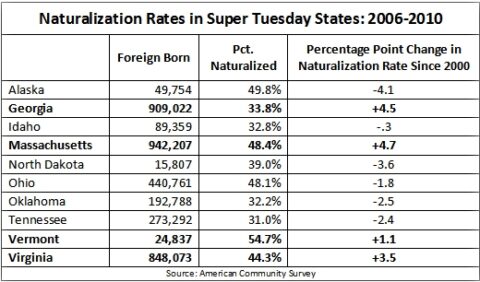Immigration Reform

States Continue to Propose Tuition Equity for Undocumented Immigrants
While some state lawmakers continue to push extreme “get tough” immigration enforcement measures through their state houses, others are contemplating the benefits of having more highly educated students in their state. In Indiana, for example, one Republican lawmaker recently amended an education bill to grant in-state tuition to undocumented students already enrolled in state schools, asking “if they’re going to be living here anyway, why not let them be productive members of Indiana society?” Lawmakers in other states, including Colorado and New York, are also pushing for better access to higher education for qualifying undocumented students. Read More

Crunching—and Clarifying—the Numbers on Prosecutorial Discretion
Late last year, the Department of Homeland Security (DHS) instructed its attorneys to review matters pending before immigration courts in search of low-priority cases warranting prosecutorial discretion. But of the approximately 300,000 immigrants now in deportation proceedings, how many stand to potentially benefit from the initiative? In recent days, immigrant advocates have fretted the figure could be as low as 1 percent—a fear based on the number of cases that had been officially suspended as of the start of last week. In truth, the actual figure presently appears closer to 10 percent. While the government bears the blame for much of the confusion, it now seems certain that advocates’ initial fears were unwarranted. Read More

Silicon Valley Leaders Fund Effort to Help DREAM Students
Although the DREAM Act remains stalled in Congress, students and youth activists across the U.S. continue to mobilize, march and fight for legislation that would provide a pathway to legal status for thousands of deserving undocumented students. But they aren’t the only ones fighting for a fair way forward for these students. The Wall Street Journal recently reported that a group of technology leaders from Silicon Valley are providing scholarships, career advice and legal assistance to undocumented students through a campaign called Educators for Fair Consideration (E4FC). Backers of E4FC— and initiatives like it—include Jeff Hawkins of Palm Pilot; Andrew Grove, cofounder of Intel; and Laurene Powell Jobs, widow of Apple’s Steve Jobs. Read More

Silicon Valley Leaders Fund Effort to Help DREAM Students
Although the DREAM Act remains stalled in Congress, students and youth activists across the U.S. continue to mobilize, march and fight for legislation that would provide a pathway to legal status for thousands of deserving undocumented students. But they aren’t the only ones fighting for a fair way forward for these students. The Wall Street Journal recently reported that a group of technology leaders from Silicon Valley are providing scholarships, career advice and legal assistance to undocumented students through a campaign called Educators for Fair Consideration (E4FC). Backers of E4FC— and initiatives like it—include Jeff Hawkins of Palm Pilot; Andrew Grove, cofounder of Intel; and Laurene Powell Jobs, widow of Apple’s Steve Jobs. Read More

Appeals Court Blocks Two More Provisions of Alabama’s Extreme Immigration Law
The U.S Court of Appeals for the 11th Circuit temporarily enjoined two more controversial provisions of Alabama’s extreme immigration law (HB 56), adding to the list of enjoined provisions. Yesterday, the 11th Circuit blocked Section 27, which bars Alabama courts from enforcing a contract with an unlawfully present person, and Section 30, which makes it a felony for an undocumented immigrant to enter into a “business contract” (including business licenses, mobile home registration and basic utilities, like water, gas, and electric services) with the state. The sections of Alabama’s law that remain in effect include the “papers please” provision, which requires law enforcement officers to determine the legal status of those when stopped or arrested whom they have reasonable suspicion to believe is in the U.S. without documents, as well as an E-Verify provision. Read More

Why the Scott Gardner Act is Unconstitutional…and a Bad Idea
Immigration hardliners never hesitate to claim the mantle of “states’ rights” when defending laws like Arizona SB 1070. But those wanting local cops to double as federal immigration agents were conspicuously silent at a congressional hearing on Wednesday on the Scott Gardner Act, a bill that (among other things) would require police to run extra background checks on foreign nationals arrested for drunk driving. Instead, it was pro-immigrant members of Congress who had to remind the legislative sponsors that the Constitution prohibits the federal government from imposing unfunded mandates on states—all while explaining the many reasons why the bill would make bad policy. Read More

Mother Jones Exposes Inner Workings of the Self-Deportation Movement
In its March/April issue, Mother Jones Magazine goes “inside the self-deportation movement,” exploring “164 state anti-immigration bills and the forces behind them.” The concept of “self deportation,” popularized by GOP presidential contender Mitt Romney, is central to the philosophy of “attrition through enforcement.” The basic idea is that, if you make life hard enough for unauthorized immigrants, they will pick up and leave of their own accord, which means the state will not have to hunt them down, detain them, and deport them. Read More

Mother Jones Exposes Inner Workings of the Self-Deportation Movement
In its March/April issue, Mother Jones Magazine goes “inside the self-deportation movement,” exploring “164 state anti-immigration bills and the forces behind them.” The concept of “self deportation,” popularized by GOP presidential contender Mitt Romney, is central to the philosophy of “attrition through enforcement.” The basic idea is that, if you make life hard enough for unauthorized immigrants, they will pick up and leave of their own accord, which means the state will not have to hunt them down, detain them, and deport them. Read More
Make a contribution
Make a direct impact on the lives of immigrants.
